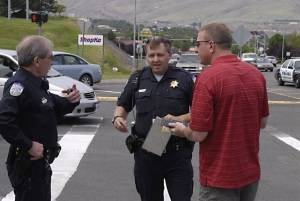Mythbusters: The Police Edition
Law and Order. CSI. The Shield. The Departed. End of Watch.
If these shows and movies taught you everything you know about the police and the criminal justice system, you might be left with many false impressions about the rules for dealing with the police as an ordinary citizen. To clear up some of this confusion, we offer the following explanations of some common myths about the police:
1. Do I Have to Talk to the Police?
Simply put, no. The Fifth Amendment gives you the right to refuse to provide incriminating statements against yourself. If the police begin to ask you questions, you can politely refuse and ask if you are free to leave.
2. If I Don’t Help the Police, Can I Be Charged with Obstructing Justice?
This is generally not true. Obstruction of justice usually requires more than just a lack of cooperation. It usually requires an act by you to inhibit an investigation. Some examples of obstruction include lying to the police or in court, intentionally misleading the police, destroying evidence, or tampering with witnesses.
3. Can I Be Arrested If I Don’t Give the Police My ID?
This depends on the situation. In California, you cannot be arrested simply for not providing proof of identification when a police officer asks for it. However, this is different than being asked to provide your driver’s license when you are pulled over while driving. That is considered a police officer asking for you to prove that you are allowed to drive, not for proof that you are who you say you are.
4. Does a Cop Have to Identify Himself When Asked?
When police are working undercover, they are not required to identify themselves as police officers simply because someone asks. Doing so could endanger the officer’s safety, and the courts have said that police can lie to suspects.
5. Am I Free to Go If Police Don’t Read Me My Rights?
No, you are not free to go if you do not receive a Miranda warning. The reading of rights is only required before a “custodial interrogation,” meaning a situation where a reasonable person would not feel free to end a police interrogation and leave. The warning is only given when a suspect is to be interrogated, not just for an arrest.
6. Is Forensic Science Foolproof?
Absolutely not. Think about the number of places you walk every day. With every step you take, it is possible that you are taking someone else’s hair or skin cells with you on your shoes. What you see on CSI is a Hollywood fantasy about crime labs actually solving cases with perfectly preserved pieces of DNA evidence that in reality almost never exist.
7. Does the Insanity Defense Mean a Killer Goes Free?
Even if a defendant avoids a prison sentence for murder through an insanity defense, he or she does not just get to go free when the trial is over. Generally, a defendant who is successful in using this defense is still placed in the custody of a mental institution until they are deemed to be no longer a threat to society. In cases where the defendant is truly insane, he or she may never be released.
8. Can Police Bust Through My Front Door at Any Time?
This is common on shows like The Shield where the police do not operate within the law. The Fourth Amendment protects against searches of a person’s home without a warrant. Generally, the police must “knock-and-announce,” meaning they have to inform the occupant of their presence, and give them the opportunity to open the door. There are a few exceptions to the rule, but in order for any evidence from the search to be used in a case against you, the police will have to provide reasons to support their unannounced entry.
9. Does a Traffic Cop Have to Park Where He is Visible to Drivers?
This is a myth. A traffic officer does not have to park his car or motorcycle where you can see him in order to issue a valid traffic ticket. Usually, when you see an officer on the side of the road watching traffic, it is not because he believes that a ticket will be thrown out if he is not seen first. He is in plain sight because he wants you to know that he is there so that you drive more carefully.
Contact the Attorneys at Wallin & Klarich to Learn More

Do you have questions about your rights when dealing with the police? At Wallin & Klarich, our attorneys have been successfully defending clients in all types of criminal cases for more than 40 years. Contact us today for a free, no obligation consultation and let us answer your questions.
With offices in Los Angeles, Sherman Oaks, Torrance, Tustin, San Diego, Riverside, San Bernardino, Ventura, West Covina and Victorville, there is a Wallin & Klarich attorney experienced in California’s laws near you, no matter where you work or live.
Call us today at (877) 4-NO-JAIL or (877) 466-5245 for a free phone consultation. We will be there when you call.


